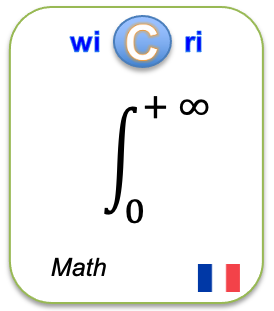Multiplicative decomposability of shifted sets
Identifieur interne : 000282 ( Istex/Curation ); précédent : 000281; suivant : 000283Multiplicative decomposability of shifted sets
Auteurs : Christian Elsholtz [Royaume-Uni]Source :
- Bulletin of the London Mathematical Society [ 0024-6093 ] ; 2008-02.
Abstract
The following two problems are open. Do two sets of positive integers 𝒜 and ℬ exist, with at least two elements each, such that 𝒜+ℬ coincides with the set of primes 𝒫 for sufficiently large elements? Let 𝒜={6, 12, 18}. Is there an infinite set ℬ of positive integers such that 𝒜ℬ+1⊂𝒫? A positive answer would imply that there are infinitely many Carmichael numbers with three prime factors. In this paper we prove the multiplicative analogue of the first problem, namely that there are no two sets 𝒜 and ℬ, with at least two elements each, such that the product 𝒜ℬ coincides with any additively shifted copy 𝒫+c of the set of primes for sufficiently large elements. We also prove that shifted copies of sets of integers that are generated by certain subsets of the primes cannot be multiplicatively decomposed.
Url:
DOI: 10.1112/blms/bdm105
Links toward previous steps (curation, corpus...)
- to stream Istex, to step Corpus: Pour aller vers cette notice dans l'étape Curation :000307
Links to Exploration step
ISTEX:78B1CD9CD13CE8BCBDF1C03688DAB15982C2E5DALe document en format XML
<record><TEI wicri:istexFullTextTei="biblStruct"><teiHeader><fileDesc><titleStmt><title>Multiplicative decomposability of shifted sets</title><author wicri:is="90%"><name sortKey="Elsholtz, Christian" sort="Elsholtz, Christian" uniqKey="Elsholtz C" first="Christian" last="Elsholtz">Christian Elsholtz</name><affiliation><mods:affiliation>Department of MathematicsRoyal HollowayEghamSurrey TW20 0EXUnited Kingdom</mods:affiliation><wicri:noCountry code="no comma">Department of MathematicsRoyal HollowayEghamSurrey TW20 0EXUnited Kingdom</wicri:noCountry></affiliation><affiliation wicri:level="1"><mods:affiliation>E-mail: christian.elsholtz@rhul.ac.uk</mods:affiliation><country wicri:rule="url">Royaume-Uni</country></affiliation></author></titleStmt><publicationStmt><idno type="wicri:source">ISTEX</idno><idno type="RBID">ISTEX:78B1CD9CD13CE8BCBDF1C03688DAB15982C2E5DA</idno><date when="2008" year="2008">2008</date><idno type="doi">10.1112/blms/bdm105</idno><idno type="url">https://api.istex.fr/document/78B1CD9CD13CE8BCBDF1C03688DAB15982C2E5DA/fulltext/pdf</idno><idno type="wicri:Area/Istex/Corpus">000307</idno><idno type="wicri:explorRef" wicri:stream="Istex" wicri:step="Corpus" wicri:corpus="ISTEX">000307</idno><idno type="wicri:Area/Istex/Curation">000282</idno></publicationStmt><sourceDesc><biblStruct><analytic><title level="a">Multiplicative decomposability of shifted sets</title><author wicri:is="90%"><name sortKey="Elsholtz, Christian" sort="Elsholtz, Christian" uniqKey="Elsholtz C" first="Christian" last="Elsholtz">Christian Elsholtz</name><affiliation><mods:affiliation>Department of MathematicsRoyal HollowayEghamSurrey TW20 0EXUnited Kingdom</mods:affiliation></affiliation><affiliation wicri:level="1"><mods:affiliation>E-mail: christian.elsholtz@rhul.ac.uk</mods:affiliation><country wicri:rule="url">Royaume-Uni</country></affiliation></author></analytic><monogr></monogr><series><title level="j">Bulletin of the London Mathematical Society</title><idno type="ISSN">0024-6093</idno><idno type="eISSN">1469-2120</idno><imprint><publisher>Oxford University Press</publisher><date type="published" when="2008-02">2008-02</date><biblScope unit="volume">40</biblScope><biblScope unit="issue">1</biblScope><biblScope unit="page" from="97">97</biblScope><biblScope unit="page" to="107">107</biblScope></imprint><idno type="ISSN">0024-6093</idno></series></biblStruct></sourceDesc><seriesStmt><idno type="ISSN">0024-6093</idno></seriesStmt></fileDesc><profileDesc><textClass></textClass></profileDesc></teiHeader><front><div type="abstract">The following two problems are open. Do two sets of positive integers 𝒜 and ℬ exist, with at least two elements each, such that 𝒜+ℬ coincides with the set of primes 𝒫 for sufficiently large elements? Let 𝒜={6, 12, 18}. Is there an infinite set ℬ of positive integers such that 𝒜ℬ+1⊂𝒫? A positive answer would imply that there are infinitely many Carmichael numbers with three prime factors. In this paper we prove the multiplicative analogue of the first problem, namely that there are no two sets 𝒜 and ℬ, with at least two elements each, such that the product 𝒜ℬ coincides with any additively shifted copy 𝒫+c of the set of primes for sufficiently large elements. We also prove that shifted copies of sets of integers that are generated by certain subsets of the primes cannot be multiplicatively decomposed.</div></front></TEI></record>Pour manipuler ce document sous Unix (Dilib)
EXPLOR_STEP=$WICRI_ROOT/Wicri/Mathematiques/explor/SophieGermainV1/Data/Istex/Curation
HfdSelect -h $EXPLOR_STEP/biblio.hfd -nk 000282 | SxmlIndent | more
Ou
HfdSelect -h $EXPLOR_AREA/Data/Istex/Curation/biblio.hfd -nk 000282 | SxmlIndent | more
Pour mettre un lien sur cette page dans le réseau Wicri
{{Explor lien
|wiki= Wicri/Mathematiques
|area= SophieGermainV1
|flux= Istex
|étape= Curation
|type= RBID
|clé= ISTEX:78B1CD9CD13CE8BCBDF1C03688DAB15982C2E5DA
|texte= Multiplicative decomposability of shifted sets
}}
|
| This area was generated with Dilib version V0.6.33. | |

